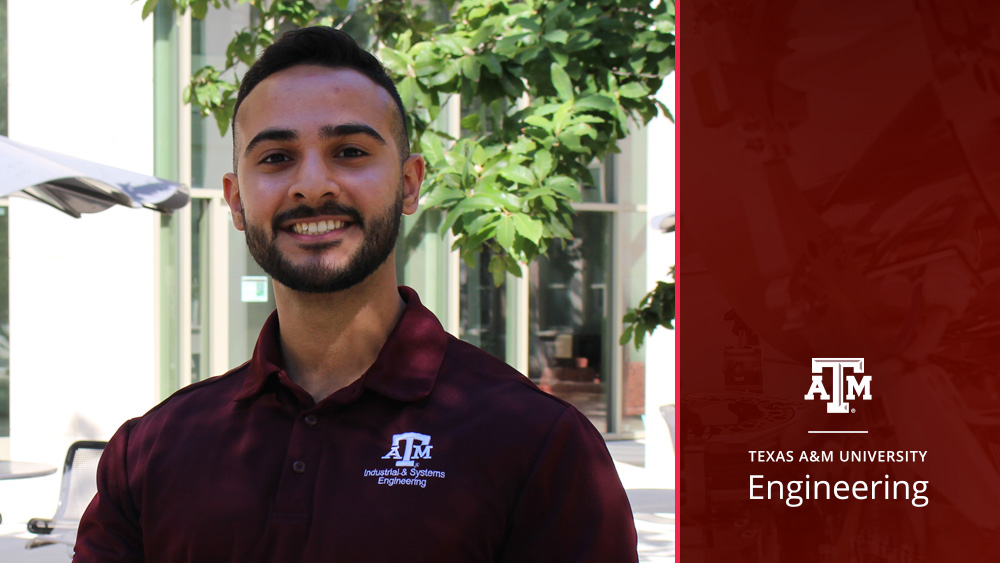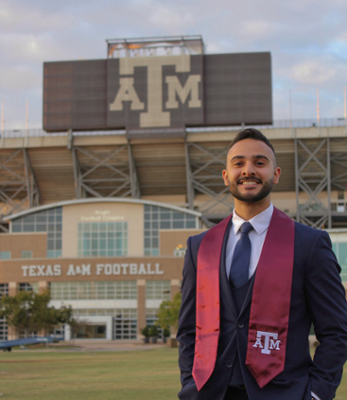
Hayder Alhilo moved from Iraq to the United States with his family in 2017. In 2020, he enrolled at Texas A&M University as a first-generation student and has been involved in undergraduate research and multiple internships. He also served as vice president of the Texas A&M chapter of the Institute of Industrial and Systems Engineers and recruitment chair for the Professional Brotherhood of Engineers.
After graduating in December, Alhilo will start a job at Dow Inc. as a supply chain engineer in January.
Q: What drew you to industrial and systems engineering?
A: It is a broad department and being an industrial and systems engineer will allow me to get into many different industries, job positions and experiences. It also has a business side in addition to engineering. I can get into the people aspect of engineering, such as consulting, supply chain and management. I wanted to study something that would allow me to work in project management and work directly with people while using my engineering skills.
Q: You are a first-generation student. What surprised you once you were on campus? What was expected?
A: What surprised me was that, of course, I made a lot of mistakes. I went to the wrong major at first. I took the wrong classes; I didn't have enough guidance. I did not have the experience of a person who went to college and told me what I needed to do and what I didn’t want to do. I had to make my own mistakes and learn from them. That was surprising. What was not surprising was that I knew I had to ask questions, network and try to experience new things that I wasn't told to try. I knew I had to learn on my own because if I asked my parents, they didn’t know — they never went to college. They only graduated from high school, and they also graduated in another country. As an immigrant first-generation student, it was tough for me to learn the culture, get used to the language and, from there, learn how the school system/job hunting works.
Q: What tips do you have for first-generation students?
A: Network. Talk to people, ask questions as early as possible and learn from others’ mistakes. That's something I started doing midway through my school career, getting into organizations, getting involved as much as possible and hearing other people's experiences. Once this happened, I started getting into leadership, getting help from others and helping others. Make your own mistakes, but network, talk to people and get involved so you can learn from and hear other experiences.
Q: How has being part of student organizations influenced your time here at Texas A&M?
A: Getting involved allowed me to make long-lasting friendships and get to know many people involved in companies, internships and other student organizations. Being a leader in organizations also improved my skills and taught me new skill sets. You develop better ways to communicate with people and gain emotional intelligence when you build these relationships. I was motivated to get out of my comfort zone and look outside the box. After developing those professional and interpersonal skills, I started helping other people. I now really enjoy it when I see them getting jobs, speaking with recruiters and doing well in their classes. I only had that help once I asked and worked with others. Also, getting involved allowed me to build an extensive network, which helps with giving or receiving help, bringing people together and giving back.

A: I worked at BMW (co-op) and then at Tesla (internship) for two different summers. My experience was very positive, and I learned a lot. I applied what we learned here in classes — quality engineering, coding, systems engineering, process improvement and mainly interpersonal skills.
Learning about project management helped me communicate with higher management and better prepared me to lead other teams. I was managing a lot of projects and making decisions for big-name companies, in addition to being responsible for managing people and running complicated systems. I'm still not as knowledgeable as some experienced people in industry, but with the Aggie network, the knowledge we gain here and the experiences we get to have, I got the opportunity to shine.
Q: Are you still thinking about the automobile industry as something that you'd like to work in after graduation, or did you learn that you’d rather work elsewhere?
A: That's the point of an internship — to learn what you want and what you don't want. I did enjoy the manufacturing environment for a short time, but I don't see myself being there long term. That's why I switched my career perspective to supply chain within the chemical and oil and gas fields. I prefer a style of management with decision-making and new challenges every day.
Q: From your experience — especially as a leader — what part of the Aggie network do you think current students should better utilize?
A: A lot of people don't really understand the second piece of the word Aggie network. They are Aggies, but they don't network. If you look at alumni Aggies, you will see that most of them are leaders and managers working in many industries. They would love to talk to you, hire you or share their experiences with you. Remember, we all hold the same values as Aggies. We were all accepted to this university for a reason. Some students don't like to get into leadership, they don't like to network and they don't ask questions, which causes them to lose lots of opportunities. I also notice that some students don’t get to know people outside their circle, network with other majors, ask about each other’s backgrounds and understand others’ experiences. We're all unique individuals. If students network, they will realize, “Yes, I have a huge opportunity to grow and learn.” We have a tremendous amount of support after school because of the Aggie spirit and the Aggie network.
Q: What general advice do you have for students?
A: Your net worth is your network. Build your network and connections as early as possible and be a leader. You will be able to help people when you join the industry. Always think about how you can give back and help others. Use the resources that are available on campus. Try to get a mentor and ask if any professors or faculty members have time to mentor you. These people have knowledge and experience. I met with lots of professors who gave me pieces of advice on things that I’d never even thought about. As a first-generation student, I needed those mentors. Finally, challenge yourself, get involved, get into organizations, compete, climb into leadership positions, make friends and most importantly, have fun.